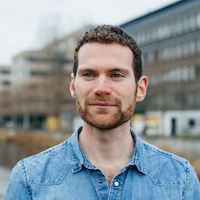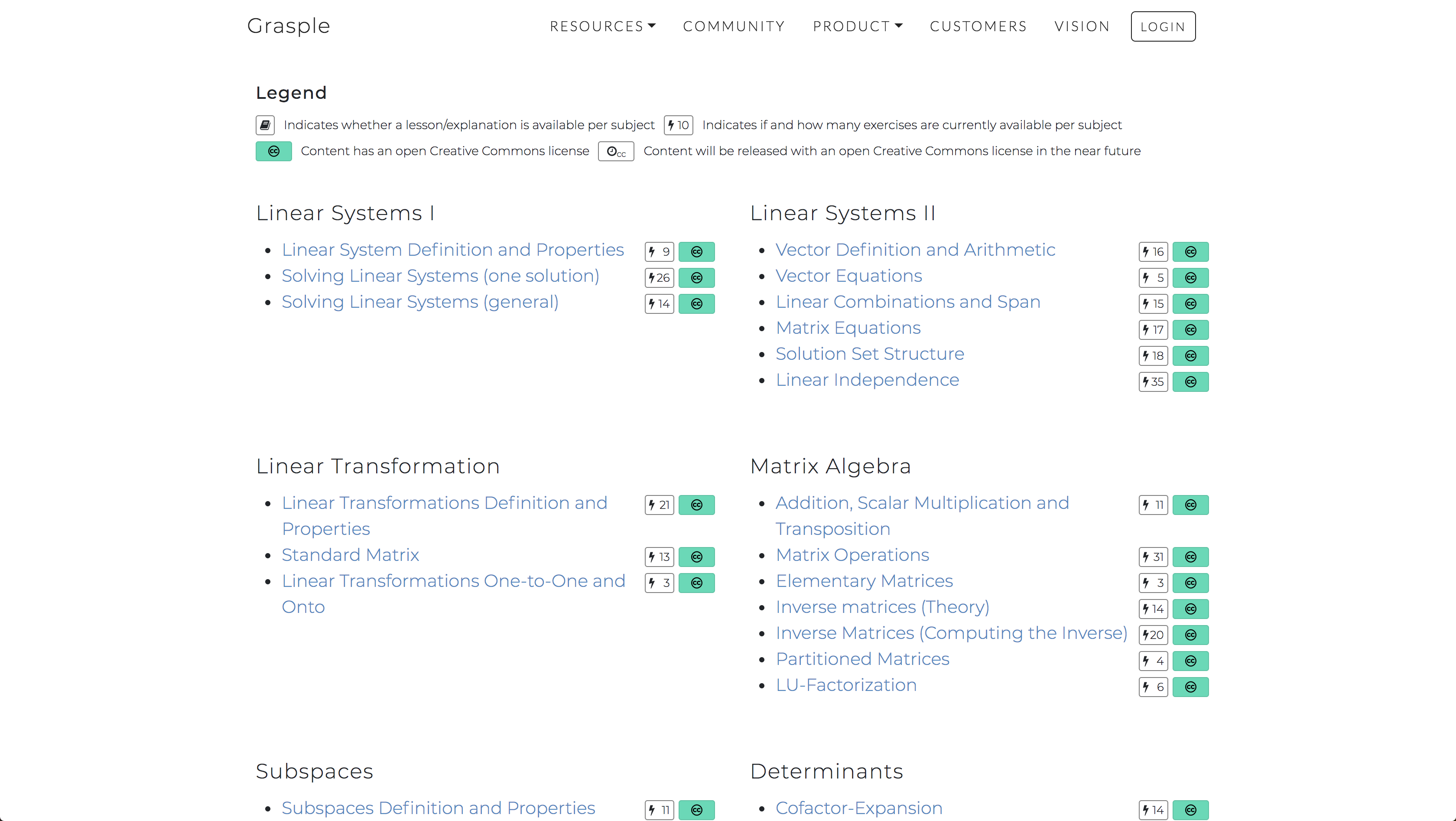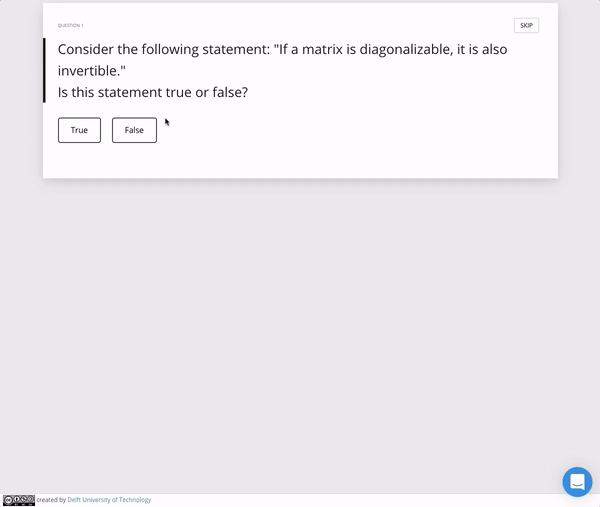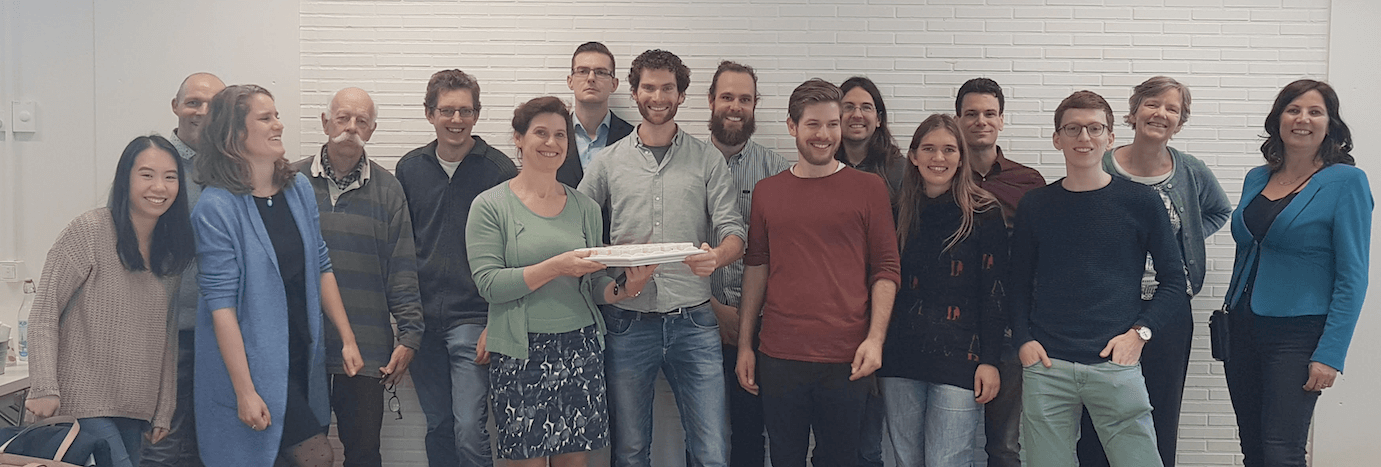TU Delft releases 535 open exercises on Linear Algebra!
TU Delft has decided to release their collection of 535 online exercises on Linear Algebra under a Creative Commons license.

by Pim Bellinga
Co-Founder of Grasple
TU Delft has decided to release their entire collection of 535 online exercises on Linear Algebra under Creative Commons-license (CC-BY-NC-SA). All exercises have been created and reviewed by TU Delft lecturers. They are used by the staff of the Delft Institute of Applied Mathematics (DIAM) in all the undergraduate Linear Algebra courses in interfaculty education, developed in the Programme of Innovation In Mathematics Education (PRIME) at TU Delft.
At Grasple, we’re very excited that TU Delft has decided to take this step and we’re honored to have been chosen to host the exercises such that anyone with an internet connection can practice Linear Algebra. Together, step by step, we can help everyone in the world to enjoy high-quality education!
In this article, you can read more about:
- What subjects does the collection cover and how to make use of it?
- Why did the TU Delft decide to open up this collection for the public?
- How did TUDelft create the collection and how do they use it?
- Any recommendations for other educators who want to reuse the exercises from this collection?
1. What subjects does the collection cover and how to make use of it?
Want to explore if the exercises may fit your course? The best thing to do is to check out the collection and try the exercises yourself!
Visit www.grasple.com/math/linear-algebra/ and you can browse each subject.

Part of the linear algebra collection released by Delft University of Technology
Overview of the collection
- The collection covers 50 subjects on the foundations of Linear Algebra.
- Many of the exercises are parameterized, so that students are provided different values each time they practice.
- The subjects cover topics such as
- Systems of Linear Equations
- Transformations
- Linear (In)dependence
- Matrix Calculations
- Determinants
- Vector spaces
- Eigenvalues
- Orthogonality
- Symmetric Matrices
- and many other topics
- The collection is being used at TU Delft by the Engineering programs, including Civil Engineering, Aerospace Engineering, Computer Science, Mechanical and Maritime Engineering, Applied Earth Sciences, and Electrical Engineering.
- The difficulty within the subjects increases with every exercise. TU Delft, therefore, uses the ‘fixed order’ setting in Grasple, as opposed to the default ‘adaptive order’ in Grasple.
- Every subject contains at least one example exercise with extensive feedback.
Parameterized exercises
Christophe, one of the lecturers who created the exercises in the collection:
“We are happy that many of the exercises are parameterized. This has two advantages:
- students can practice more
- exercises can be used in self-tests, without the possibility of answers being passed around.”
More diverse exercises: counterexamples
Christophe: “Using Grasple’s newer functionalities, the exercises have become more diverse. For instance, we now also ask students to provide ‘counterexamples’ to statements. They can give an infinite amount of correct answers, Grasple checks if it matches the requirements that are provided.”
See one of the the counterexamples in action below

A counterexample exercise from the new open Linear Algebra collection. Check it out yourself here.
“It is important that materials are shared with as many like-minded colleagues as possible. It can increase opportunities and equity for both students and teachers all around the world.”
– Annoesjka Cabo, Director of studies, interfaculty education at Delft University of Technology
2. Why did the TU Delft decide to open up this collection for the public?
Annoesjka Cabo, Director of Studies of the interfaculty math education at TU Delft on why TU Delft did decide to open up this collection for the public:
“It is important that materials are shared with as many like-minded colleagues as possible. This increases the community feeling and mutual trust. By sharing and reusing materials, the quality and thus the experience for students improves. Our vision at TU Delft is to ‘educate the world’. That is also possible by releasing large collections of open exercises. It can increase opportunities and equity for both students and teachers all around the world.”
Read more about TU Delft’s Open Education plans and ambitions here.
3. How did TUDelft create the collection and how do they use it?
Ilse Bakker, the coordinator of the ongoing curation and staff member of PRIME: “At TU Delft, students use the Linear Algebra exercises as pre- and post-lecture homework exercises. In the pre-lecture exercises, prior knowledge is being activated and students answer questions about the pre-lecture video they are expected to watch before the lecture. In the post-lecture exercises, students practice the topics that were addressed during the lecture.”
How was the collection created and how has the quality been checked?
For 12 weeks, lecturers Iris, Christophe, and Hans came together under the coordination of Ilse. Every team member spent approximately six hours per week creating and reviewing exercises. Some of the exercises were recycled from older OpenCourseWare exercises, but the largest part was created from scratch.
Christophe: “If other lecturers and students think the exercises are useful, that would be a wonderful additional benefit. Hopefully, it will stimulate others to reuse or review the exercises, or create additional repositories and make those open as well.”
4. Any recommendations for other educators who want to reuse the exercises from this collection?
Ilse: “We have tried to create a comprehensive collection of exercises for typical topics in a Linear Algebra course. You can create your own selection that matches your course. Perhaps you find it beneficial to add more hints or feedback. Please feel free to do so.
You may also want to check out the new answer checks that Grasple has made available the past weeks. They offer a lot of creative ways to create new types of exercises and personalized feedback.
We’d be very happy to hear if you choose to reuse parts of the collection. If you have any feedback on how the exercises can be improved or extended, please let us know as well. We hope you enjoy the materials!”
Annoesjka: “I would like to thank Christophe Smet, Iris Smit, Hans Verheij and the rest of the DIAM team, as well as Ilse Bakker and all the student assistants of the PRIME team, for creating and still actively curating the exercises and making them openly available for everyone.”
 The TU Delft and Grasple team celebrating open education
The TU Delft and Grasple team celebrating open education
At Grasple, we are very excited to see educators like Christophe, Iris, Hans, and Ilse work together to help students practice difficult concepts in topics like Linear Algebra and to see them share the results of their hard labor with everyone in the world.
Together, step by step, we can help everyone in the world to enjoy high-quality education!
We e-mail once a month. We promise we value your inbox, so no spam.




